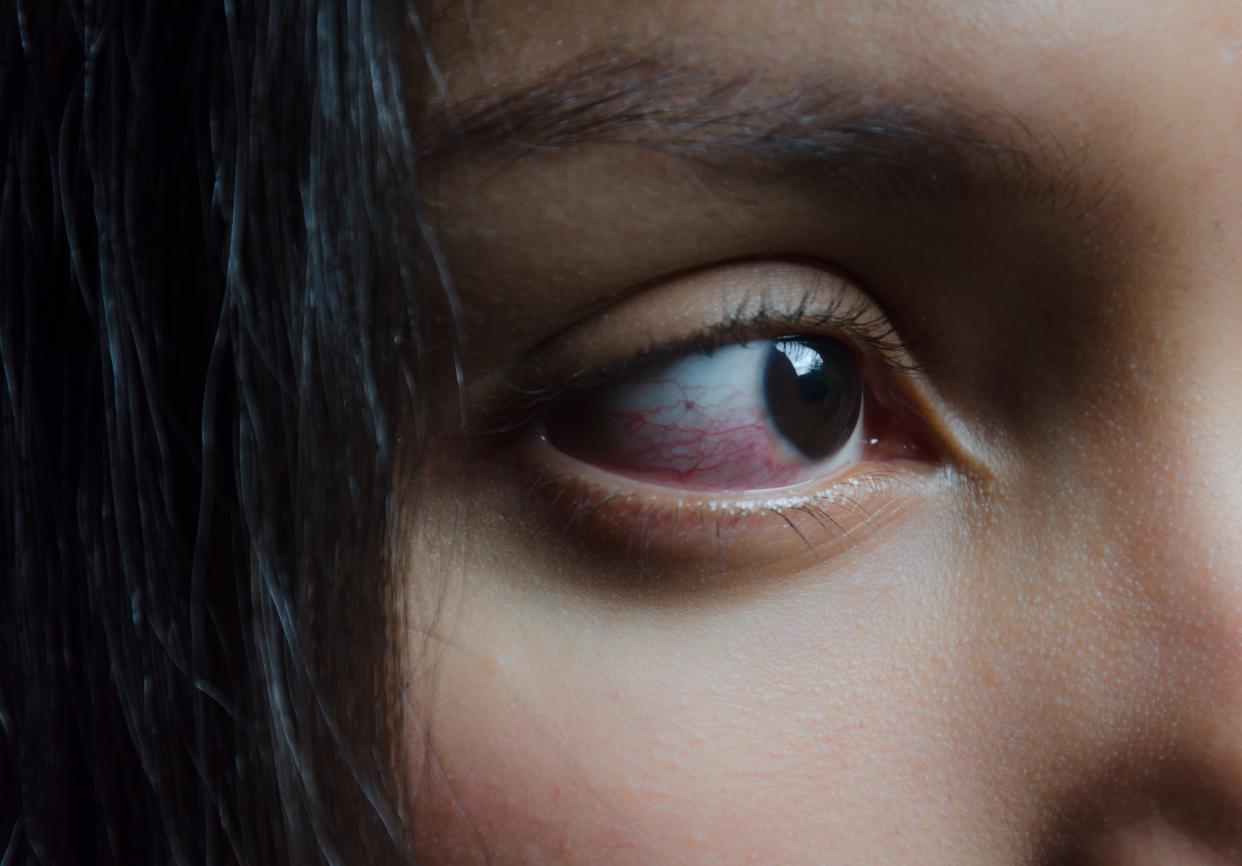How to Tell If Your Bloodshot Eyes Are Actually Ocular Rosacea

Bloodshot eyes can be attributed to a multitude of things: allergies, a lack of sleep, or even smoking weed. But in some cases, it can be a sign of something more serious, like ocular rosacea, a condition characterized by significant inflammation of the eye and its surrounding area.
While prevalent, ocular rosacea isn't nearly as talked about as the rosacea that occurs on skin, so we did a deep dive to find out more. After all, many as 10 million people in the U.S. alone may be affected by the condition, and up to 50 percent of people who have facial rosacea also develop ocular rosacea. We talked to experts about its causes, how you can treat it, and more, so if you're interested, just keep on reading.
What is ocular rosacea, and what causes it?
Unfortunately, doctors don't know exactly what causes rosacea, and the same goes for ocular rosacea. According to Harsha Reddy, the assistant chief of oculoplastics and reconstructive surgery at the New York Eye and Ear Infirmary of Mount Sinai in New York City, research suggests that it's an auto-immune disease, but that genetic, bacterial, and environmental factors may also play a role in its occurrence. He adds that many people with facial rosacea also have ocular rosacea, or will develop it at a certain point. And unfortunately, there's no way to avoid developing the disease, according to Washington, D.C.-based dermatologist Adam Friedman.
Symptoms can be subtle or severe.
As you might imagine, those with ocular rosacea experience very similar symptoms to that of facial rosacea, meaning the eye area can get extremely red and start to burn or sting. Reddy notes that it can also make you feel like you have something stuck in your eye and can cause sties in some patients. Even more alarming, though, is that it can sometimes result in vision loss in severe cases, according to Friedman. Needless to say, if you're struggling with any of the aforementioned symptoms, it's important to make an appointment with an ophthalmologist as soon as possible for a proper diagnosis.
There are myriad things that can trigger it
Friedman says ocular rosacea can become exacerbated by factors like alcohol consumption, excess caffeine intake, eating dairy, prolonged sunlight exposure, stress, and extreme weather conditions. Additionally, Reddy explains that it's crucial to completely remove one's eye makeup to avoid bacteria buildup and irritation, as this can easily worsen the condition.
How is it treated?
Sadly, there is no cure for facial or ocular rosacea, so instead, people rely on a variety of in-office and over-the-counter treatments to tackle their symptoms. Friedman recommends a multi-faceted medical approach that features the use of several different remedies. "[Treatment] should include artificial tears and lubricating ointments to heal the lining of the cornea, good lid hygiene, low dose anti-inflammatory antibiotics such as doxycycline and azithromycin, for even mild eye disease, and when needed, steroids and cyclosporine drops," he says. Some good news? Reddy says that most patients are able to successfully manage their symptoms under the care of an ophthalmologist and dermatologist.
At-home remedies can be helpful
While at-home remedies might not be as fast-acting or aggressive as prescribed medication, there are a few things you can do to alleviate symptoms from the comfort of your own couch. "From a DIY approach, try warm compresses to unclog the eyelid glands and massage to express the contents of said glands," says Friedman, who adds that artificial tears (like these from Refresh Optive) can be helpful, too. Reddy agrees and says artificial tears can be very effective at treating the irritation and dryness that result from rosacea. He also says you can use baby shampoo or commercially available eyelid scrubs to remove debris from the eyelashes and keep the area clean.
In short: With the proper diagnosis and treatment plan from your doctor, you can get ocular rosacea under control. If you suffer from chronic eye irritation that you don't believe to be related to allergies, make an appointment with your ophthalmologist so you can figure out a solution together.
For more on skin conditions:
Woman Becomes Beauty Queen After Being Bullied for Skin Condition
What You Should Never Say to Parents of a Child With a Skin Condition
Now, check out 100 years of acne treatments:
Follow Allure on Instagram and Twitter, and subscribe to our newsletter for daily beauty stories delivered right to your inbox.

